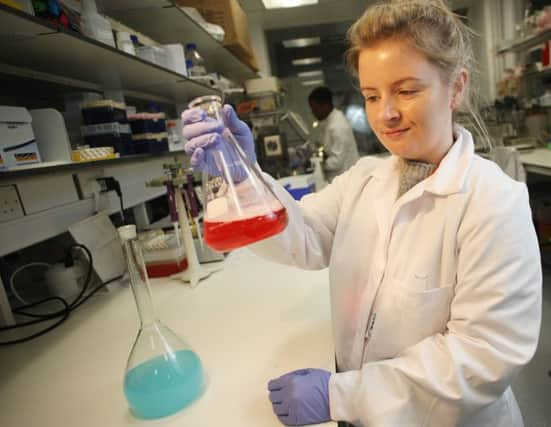Dungiven scientist involved in ground breaking discovery


Local woman Dr Karla O’Neill and Professor David Grieve lead the research, funded by the British Heart Foundation, which discovered that cells produced in the human body could be used to heal damaged blood vessels.
Their findings have recently been published in the journal, ‘Cardiovascular Research’.
Advertisement
Hide AdAdvertisement
Hide AdThe discovery could lead to new treatments for many conditions associated with decreased blood delivery in key organs, including heart failure following a heart attack, diabetes, peripheral arterial disease and some types of stroke.
The team, who are based at Queen’s University Belfast, have found that increasing levels of a protein known as NOX4 in a specific type of blood cell can increase the formation of new blood vessels.
Dr O’Neill said: “Blood vessels are a critical component of the circulatory system supplying blood containing oxygen and nutrients to vital organs such as the heart and brain. Growing and repairing these vessels is a major goal in treating heart and circulatory diseases.
“This finding could pave the way for new discoveries in regenerative medicine and allow scientists in the future to grow new functional blood vessels and repair those that are damaged in many forms of heart and circulatory diseases.”
Advertisement
Hide AdAdvertisement
Hide AdDr O’Neill told the ‘Journal’ she had always wanted to be a scientist and that the discovery is ‘really exciting’.
The scientist said she hopes to apply for a fellowship with the British Heart Foundation later this year to carry out research into cardiovascular disease.
“I feel a real connection with BHF and the money raised by the public is used to fund this research. The BHF are absolutely fantastic and have been absolutely brilliant to me as a working mum.”
Dr O’Neill said she feels ‘very strongly’ about women having careers in STEM subjects.
Advertisement
Hide AdAdvertisement
Hide Ad“You can be a working mum and have a career in this field. It is really important for me to show that to my children, particularly my daughter. Scientist’s get to do and see things no human ever should, like see the inside of cells or what genes are being turned on and off. I absolutely love this job. It is a lot of work and this discovery has taken four years, but it is all worthwhile in the end.
“I actually have contributed to science and if my children become scientists in the future they will be able to read my paper and who knows, it could even feed into research they do.”